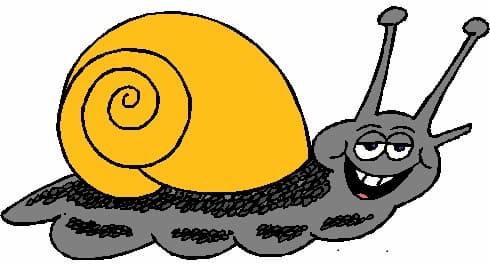Slugs and Snails in the Garden

About Slugs and Snails
Slugs and snails are common home garden pests. They slither around in the night, on cloudy days, and in the early morning hours. A shiny, slimy trail marks their coming and goings. They like many common flower and vegetable garden plants. They have been known to climb right into container gardens that are on the ground. Slugs and Snails even enjoy a variety of common shrubs. Are slugs and snails the same thing? No. They are related and both are gastropod mollusks. The major difference is a snail has a hard shell that they can retreat into for safety, and slugs do not. For both mollusks, home gardeners need to learn how to control slugs and snails before these slimy creatures that like to munch on many of your flower and vegetable plants.
Seemingly impossible to completely rid your garden of these pests, they can at best be controlled. There are both chemical and organic means of controlling these pests. We recommend the latter but recognize that chemical control is sometimes needed.
For controlling slugs and snails, it is important to remove their habitat and shelter. Keep your garden clean of debris. A board or piece of wood on the ground is a great home for these little pests. Mulches, consisting of large wood chips, also should be avoided.
Did you know? Slugs have four noses. Perhaps, that explains why they are so slimy.
Organic and Natural Controls for Slugs and Snails
Most everyone has heard of using beer in a dish, as effective control. Some people even suggest you bury a beer bottle up to the lip. Slugs and snails love sweet things, like your garden vegetables and flowers. They climb over the edge of the bottle or dish, fall in and drown. It works very well to control the slugs and snails around your plants.
You do not need to use beer. Soda pop, fruit juices or even sugar water works equally well. We do recommend you use plastic containers rather than glass that can shatter in your garden soil. This author uses soup or tuna cans. Make sure you know where you placed each container. You also need to empty and refill the containers regularly, and after each rain. Better yet, discard the yucky contents, container and all, and start fresh.
Another tried and true approach is a bed of coarse sand around your plants. Slugs and snails do not like coarse materials, and will not cross them. This has limited applications. But, it works well during the early stages of fruit that lies on the ground like pumpkins and melons. Gently lift the small fruit a couple of inches off the ground. Lay a bed of sand under and around where the fruit will lie, so there is at least a three to four-inch perimeter of sand on the ground around the fruit. Add more sand as the fruit grows.
Organic Tip: If you do have wooden boards in or around your garden, lift them every couple of days. Remove and dispose of any slugs and snails that you find. This works with earwigs, too.

Other common deterrents slugs and snails do not like to come in contact with include:
Wood Ash
Crushed Eggshells
Sawdust
Human or animal hair
Salt, fatal in even small quantities.
Coffee grounds, slugs don’t like them, possibly fatal to them.
Epsom Salt – Encircle the plant with organic Epsom Salt. It’s a line they will not cross.
A Note on Using Salt: Some people get a kick out of pouring salt on slugs and watching them melt. It works but is not practical in your garden. Salty soil is fatal to plants.
Natural predators are another means of control. Ducks, geese, and many birds eat slugs and snails. Unfortunately, these slug lovers may also enjoy the fruits of your garden as well as the slugs and snails.
Did You Know? A snail can sleep for three years!
Chemical Controls
Slug bait and Snail pellets and dust are readily available. But it is a chemical and should be used sparingly. It should not be spread around your garden fruits and vegetables, as it can be absorbed by the roots. Any use in the home garden should be limited to a covered container or bait trap, so wind and rain do not wash it into your soil.
Related Articles
Please support our site. Shop for:
- rmmatthews100@hotmail.com
- 585-721-6528
- Rochester, NY
©1999-2024 GardenersNet.Com, All Rights Reserved

